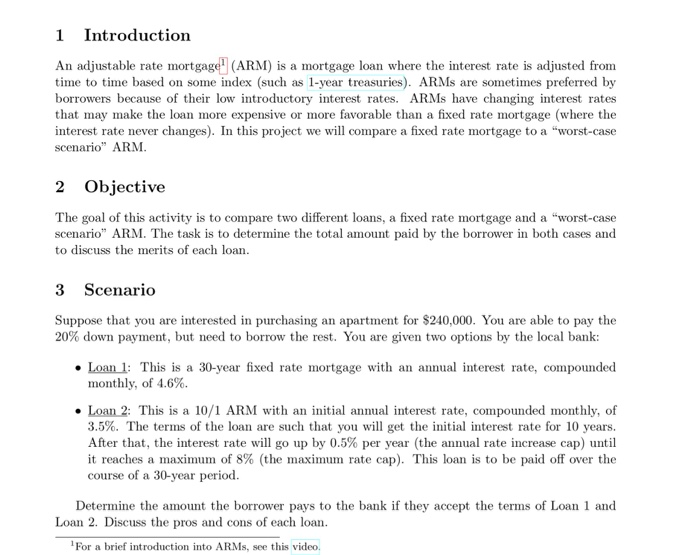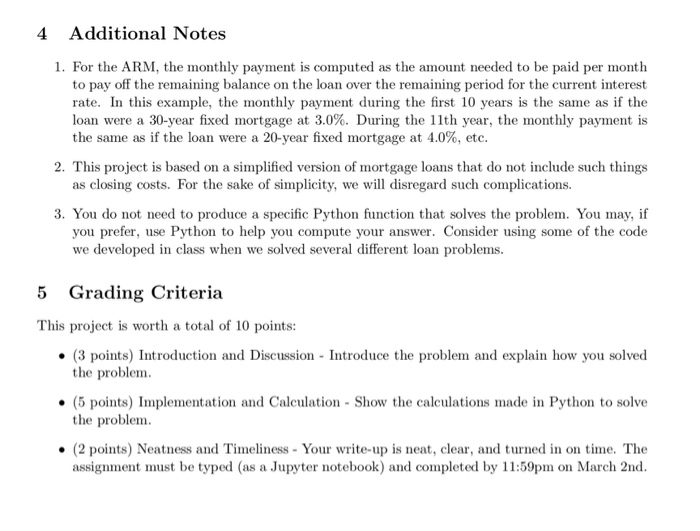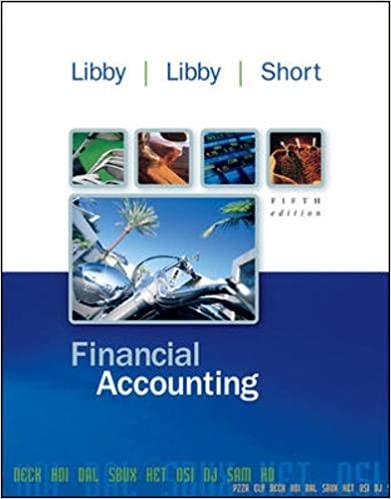1 Introduction An adjustable rate mortgage (ARM) is a mortgage loan where the interest rate is adjusted from time to time based on some index (such as 1-year treasuries). ARMs are sometimes preferred by borrowers because of their low introductory interest rates. ARMs have changing interest rates that may make the loan more expensive or more favorable than a fixed rate mortgage (where the interest rate never changes). In this project we will compare a fixed rate mortgage to a "worst-case scenario" ARM. 2 Objective The goal of this activity is to compare two different loans, a fixed rate mortgage and a "worst-case scenario" ARM. The task is to determine the total amount paid by the borrower in both cases and to discuss the merits of each loan. 3 Scenario Suppose that you are interested in purchasing an apartment for $240,000. You are able to pay the 20% down payment, but need to borrow the rest. You are given two options by the local bank: Loan 1: This is a 30-year fixed rate mortgage with an annual interest rate, compounded monthly, of 4.6%. Loan 2: This is a 10/1 ARM with an initial annual interest rate, compounded monthly, of 3.5%. The terms of the loan are such that you will get the initial interest rate for 10 years. After that, the interest rate will go up by 0.5% per year (the annual rate increase cap) until it reaches a maximum of 8% (the maximum rate cap). This loan is to be paid off over the course of a 30-year period. Determine the amount the borrower pays to the bank if they accept the terms of Loan 1 and Loan 2. Discuss the pros and cons of each loan. For a brief introduction into ARMs, see this video. 4 Additional Notes 1. For the ARM, the monthly payment is computed as the amount needed to be paid per month to pay off the remaining balance on the loan over the remaining period for the current interest rate. In this example, the monthly payment during the first 10 years is the same as if the loan were a 30-year fixed mortgage at 3.0%. During the 11th year, the monthly payment is the same as if the loan were a 20-year fixed mortgage at 4.0%, etc. 2. This project is based on a simplified version of mortgage loans that do not include such things as closing costs. For the sake of simplicity, we will disregard such complications. 3. You do not need to produce a specific Python function that solves the problem. You may, if you prefer, use Python to help you compute your answer. Consider using some of the code We developed in class when we solved several different loan problems. 5 Grading Criteria This project is worth a total of 10 points: (3 points) Introduction and Discussion - Introduce the problem and explain how you solved the problem. (5 points) Implementation and Calculation - Show the calculations made in Python to solve the problem (2 points) Neatness and Timeliness - Your write-up is neat, clear, and turned in on time. The assignment must be typed (as a Jupyter notebook) and completed by 11:59pm on March 2nd. 1 Introduction An adjustable rate mortgage (ARM) is a mortgage loan where the interest rate is adjusted from time to time based on some index (such as 1-year treasuries). ARMs are sometimes preferred by borrowers because of their low introductory interest rates. ARMs have changing interest rates that may make the loan more expensive or more favorable than a fixed rate mortgage (where the interest rate never changes). In this project we will compare a fixed rate mortgage to a "worst-case scenario" ARM. 2 Objective The goal of this activity is to compare two different loans, a fixed rate mortgage and a "worst-case scenario" ARM. The task is to determine the total amount paid by the borrower in both cases and to discuss the merits of each loan. 3 Scenario Suppose that you are interested in purchasing an apartment for $240,000. You are able to pay the 20% down payment, but need to borrow the rest. You are given two options by the local bank: Loan 1: This is a 30-year fixed rate mortgage with an annual interest rate, compounded monthly, of 4.6%. Loan 2: This is a 10/1 ARM with an initial annual interest rate, compounded monthly, of 3.5%. The terms of the loan are such that you will get the initial interest rate for 10 years. After that, the interest rate will go up by 0.5% per year (the annual rate increase cap) until it reaches a maximum of 8% (the maximum rate cap). This loan is to be paid off over the course of a 30-year period. Determine the amount the borrower pays to the bank if they accept the terms of Loan 1 and Loan 2. Discuss the pros and cons of each loan. For a brief introduction into ARMs, see this video. 4 Additional Notes 1. For the ARM, the monthly payment is computed as the amount needed to be paid per month to pay off the remaining balance on the loan over the remaining period for the current interest rate. In this example, the monthly payment during the first 10 years is the same as if the loan were a 30-year fixed mortgage at 3.0%. During the 11th year, the monthly payment is the same as if the loan were a 20-year fixed mortgage at 4.0%, etc. 2. This project is based on a simplified version of mortgage loans that do not include such things as closing costs. For the sake of simplicity, we will disregard such complications. 3. You do not need to produce a specific Python function that solves the problem. You may, if you prefer, use Python to help you compute your answer. Consider using some of the code We developed in class when we solved several different loan problems. 5 Grading Criteria This project is worth a total of 10 points: (3 points) Introduction and Discussion - Introduce the problem and explain how you solved the problem. (5 points) Implementation and Calculation - Show the calculations made in Python to solve the problem (2 points) Neatness and Timeliness - Your write-up is neat, clear, and turned in on time. The assignment must be typed (as a Jupyter notebook) and completed by 11:59pm on March 2nd








